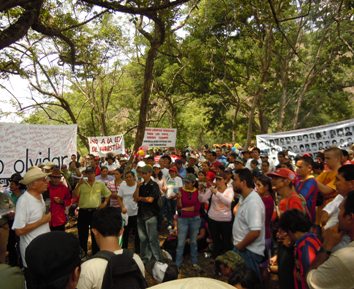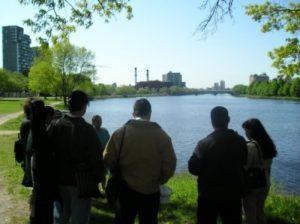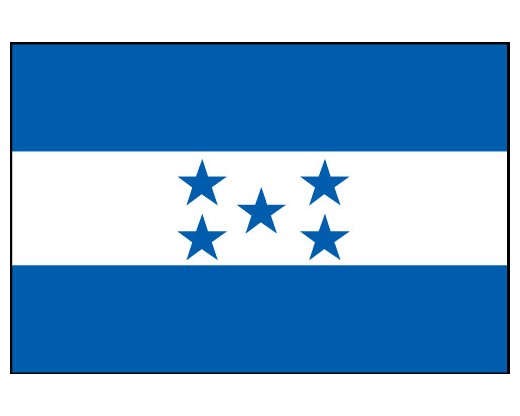Historical Memory
The Sumpul River Massacre and New Calls for Solidarity
The 14th of May is a day everyone in Chalatenango looks forward to and dreads at the same time. The anticipation is for the commemoration of the anniversary the Sumpul River Massacre, in which hundreds of youth, men and women make the trek to the site of the brutal 1980 attack on civilians. The trepidation is precisely because of the hike itself, which is straight down what can at some points be compared to a dusty cliff, and then straight back up again in the scorching mid-day sun. However, as arduous as the climb is it doesn’t stop community members, survivors and family members of victims from coming out in mass for the event.
The commemoration remembers the over 600 civilians, including children, the elderly, and pregnant women, who were murdered by Salvadoran and Honduran military forces in a military operation that was part of the “scorched earth” strategy of 1980. Today, Las Aradas, the site of the massacre, is a corn field with a few trees and a small monument to the victims. Once a year the field is filled with music, theater performances, banners, pictures and spoken homages to the victims. The activity begins with testimony from victims and survivors and finishes with a mass given by priests who have been accompanying the communities of Chalatenango since the war.
This year the communities, the Catholic Church and the CCR, the local branch of CRIPDES, had a special demand: that the the Salvadoran government recognize Las Aradas as a national historic site and construct a larger monument to honor the victims. The Salvadoran Ministry of Culture has indicated that this might be possible.
Another twist this year was the participation of members of the Honduran resistance movement. Since the Sumpul River is the border between Honduras and El Salvador, every year there are Hondurans present that witnessed the massacre or helped survivors who managed to reach Honduras. However, this year the Honduran participants played a much more central role. Father Miguel, who traditionally leads the mass at the commemoration, decided to give space during the homily to a visiting Honduran priest, Father Fausto. Also, the Hondurans present gave testimony to the brutal repression in their country and asked for solidarity from Salvadorans who remember those conditions all too well.
The situation in Honduras seems to be going from bad to worse. At the almost two year anniversary of the military coup d’etat that ousted the democratically elected president Manuel “Mel” Zelaya, human rights abuses are rampant and go uninvestigated by local authorities. Just a few months ago, the Honduran government unleashed riot police and tear gas for three weeks on tens of thousands of teachers who went on strike because their pensions and salaries were cut and their rights to collective bargaining denied. While the reasons for the strike are all too familiar to teachers in Wisconsin, the government response is much more familiar to Salvadoran teachers who lived the same type of repression in the 1970’s and 80’s.
Just as the coup affects every sector of society, so does the repression. The Nation reported that there have been over 300 killings by state security forces in Honduras since the coup, including 36 that can be proven to be politically motivated. [1] In 2010 Honduras was named the most dangerous country in the world for journalists, surpassing Iraq, Mexico, and Afghanistan, and since the coup over 12 journalists have been killed by state security forces.[2]
Even though, Honduras was in fact be reinstated into the OAS and ousted ex-President Zelaya recently returned to Honduras, the human rights organization Committee of the Families of the Disappeared Detainees in Honduras (COFADEH) declared that there is a “lack of faith in the institutions of the Honduran government regarding human rights because of the government’s institutionalized violence against its people.”[4]
This precarious situation was not only on the minds of the Hondurans at the Sumpul commemoration. As the Salvadorans present listened to the passionate testimony of Father Fausto and the protest songs played by the so-called“Songwriter of the Honduran Resistance,” they remembered their own history – the massacre of May 14th, 1980 and 22 years of repression and civil war – and the Honduran’s pleas for solidarity did not fall on deaf ears.
[1] “Open Season on Teachers in Hondurs” by Dana Frank. http://www.thenation.com/article/160472/open-season-teachers-honduras
[2] “Manuel Zelaya’s Courageous Homecoming” by Amy Goodwin. http://www.guardian.co.uk/commentisfree/cifamerica/2011/jun/01/honduras-hillaryclinton
[3] Congressional Dear Colleague Letter, May 31, 2011.
[4] Honduras Solidarity Network Press Release, May 31, 2011.



